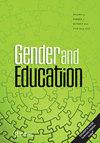情感取向与认识极化——以新自由主义大学女性主义研究为例
IF 1.9
3区 教育学
Q2 EDUCATION & EDUCATIONAL RESEARCH
引用次数: 0
摘要
摘要本文探讨了大学新自由化和绩效导向的研究经济导致的女性主义研究领域的情感一致和认识两极分化。先前的研究描述和分析了女权主义学者在新自由主义大学中为达到标准化的绩效指标并被视为“合适的知者”而进行的“认识分裂”。本文基于对女权主义学者的26次采访的数据,以5种复合形式呈现,让我们了解她们在新自由主义学院中的实践和社会组织经历。我借鉴莎拉·艾哈迈德的情感结盟理论来分析认知分裂的实践是如何被情感煽动和推动的。本文章由计算机程序翻译,如有差异,请以英文原文为准。
Affective alignment and epistemic polarization: the case of feminist research in the neoliberalized university
ABSTRACT This article explores affective alignment and epistemic polarization in the field of feminist research, resulting from the neoliberalization of the universities and a performance-oriented research economy. Previous research has described and analysed the ‘epistemic splitting’ that feminist scholars engage in to live up to standardized performance measures and be perceived as ‘proper knowers’ in the neoliberalized university. This article is based on data from 26 interviews with feminist academics, presented as 5 composites, that let us in on their practices and socially organized experiences within the neoliberalized academy. I draw on Sarah Ahmed’s theory of affective alignments to analyse how practices of epistemic splitting are affectively instigated and impelled.
求助全文
通过发布文献求助,成功后即可免费获取论文全文。
去求助
来源期刊

Gender and Education
EDUCATION & EDUCATIONAL RESEARCH-
CiteScore
5.20
自引率
9.10%
发文量
31
期刊介绍:
Gender and Education grew out of feminist politics and a social justice agenda and is committed to developing multi-disciplinary and critical discussions of gender and education. The journal is particularly interested in the place of gender in relation to other key differences and seeks to further feminist knowledge, philosophies, theory, action and debate. The Editors are actively committed to making the journal an interactive platform that includes global perspectives on education, gender and culture. Submissions to the journal should examine and theorize the interrelated experiences of gendered subjects including women, girls, men, boys, and gender-diverse individuals. Papers should consider how gender shapes and is shaped by other social, cultural, discursive, affective and material dimensions of difference. Gender and Education expects articles to engage in feminist debate, to draw upon a range of theoretical frameworks and to go beyond simple descriptions. Education is interpreted in a broad sense to cover both formal and informal aspects, including pre-school, primary, and secondary education; families and youth cultures inside and outside schools; adult, community, further and higher education; vocational education and training; media education; and parental education.
 求助内容:
求助内容: 应助结果提醒方式:
应助结果提醒方式:


